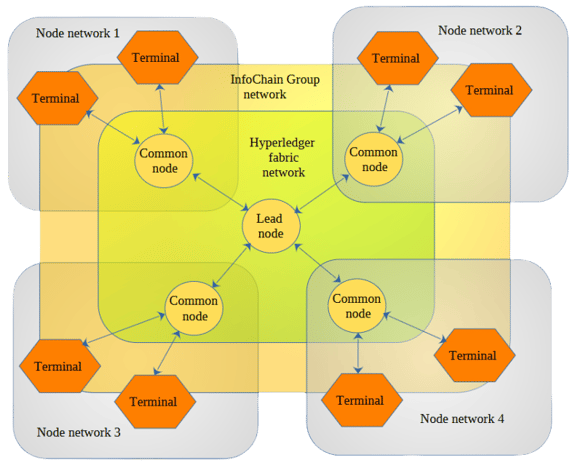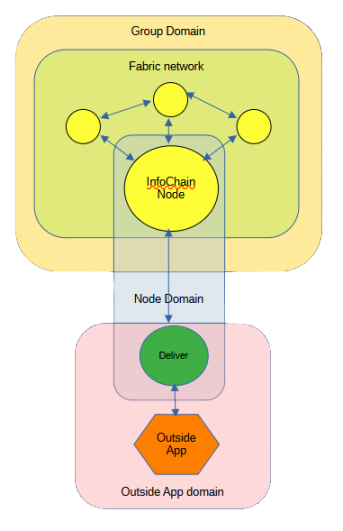InfoChain overview
In a nutshell, InfoChain is blockchain based data storage platform. It can be looked as database, has a simple interface for third part apps to access, though it contains a group of nodes to store data copies instead of central database service.
And, InfoChain is not only a storage platform, it is also a private meeting room. Data is exchanged and recorded in a closed network space. Each node verifies and endorses each other. Organizations or companies join the InfoChain group, their daily transactions, outputs and reports are no longer isolated from each other, but are connected to each other to establish a new business ecosystem.
Every InfoChain group, share a private p2p network, each node inside this group communicate with each other via this group’s p2p network directly, no need to own a public IP or URL,no need to pass through a central server to deliver data. Each node inside the InfoChain group, also has its own p2p network, via these networks, the node’s user can access data of group, meanwhile isolated from group network.
InfoChain’s developer provides one InfoChain node virtual machine image, in which has preinstalled IBM hyperledger fabric images, and a set of fabric network establishing management , data transfer control, p2p network management services.
With this virtual machine image, a user can create a new InfoChain group to increase credibility to his business and share the group name and password with his partners, or join into an existing group created by his partner, there is no technical expertise needed to setup or use infochain such as hyperledger fabric, linux script, etc.
Every InfoChain groups are isolated, every nodes assembling the group have own private p2p networks, terminals connecting with different nodes are isolated too. This framework architecture maximized data security to both InfocHain group itself and terminal users.
Please refer to below figure to understand InfoChain network structure.


Figure 1. A sample of InfoChain structure
Also refer to below figure to understand InfoChain network structure in the viewpoint of a single node.


Figure 2. A sample of InfoChain network in one node viewpoint
InfoChain provide to users
1. Trust
InfoChain is based hyperledger fabric, the decentralized blockchain platform, so from technical view, the data stored in it is impossible to be falsified or deleted, partners joined in an InfoChain group will monitor and verify submitted data to each other, and provide credit endorsement for each other. Data stored in InfoChain, specially for business data, such as quality certification record, license information, purchase and payment record, currency transfer record, etc, has the naturally eternal and unchangeable property.
2. Convenience
To deploy hyperledger fabric network is not easy, specially to organize a fabric network between multiple organizations locate in different areas or different countries, it usually need every user own public IP or public URL, need particular persons to do the deploy and maintain work. So its technical threshold is higher than common database.
But with InfoChain, the user can deploy fabric network in some simple steps, and establish a private p2p network to connect all nodes together, no need to apply for public IP or URL. Organizations or persons without IT technology support can also use InfoChain to increase his business.
3. Security
Hyperledger fabric itself has a set of strict SSL certification verifications and assignment mechanisms, which make it is a very safe blockchain platform. Beside fabric platform security mechanism, InfoChain isolates common users access p2p networks(node networks) from InfoChain data storage network(group network), thus a common user can only access one node inside an InfoChain group, unable to access the rest nodes, so that the illegal data access and modification risk is significantly reduced.
Note: As other blockchain based platform, data stored into InfoChain will be checked and verified by other users, and be synchronized to every node inside a group, so suggest users do not try to store secret data into InfoChain, such as credit card number, bank account, personal phone number, etc.
©2023
